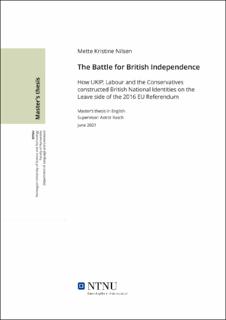| dc.contributor.advisor | Rasch, Astrid | |
| dc.contributor.author | Nilsen, Mette Kristine | |
| dc.date.accessioned | 2022-02-18T18:21:12Z | |
| dc.date.available | 2022-02-18T18:21:12Z | |
| dc.date.issued | 2021 | |
| dc.identifier | no.ntnu:inspera:80300818:21624053 | |
| dc.identifier.uri | https://hdl.handle.net/11250/2980169 | |
| dc.description.abstract | Selv om det er mye oppmerksomhet rundt spørsmålet om britiske nasjonale identiteter i forbindelse med Brexit, har ikke mye av denne forskningen fokusert på politikernes rolle i konstruksjonen av nasjonale identiteter og hvordan de kan ha påvirket eller mobilisert nasjonale identiteter for å støtte Leave kampanjen. Den Britisk-Engelske nasjonale identiteten har siden Friedrich Meinecke utviklet skillet mellom Staatsnation og Kultunation blitt brukt som et eksempel på den sentrale borgernasjonen hvis identitet primært var basert på deres institusjoner og verdier som inkludering og etnisk flertall (Reeskens & Hooghe, 2010, s.580). Dette synet ble bekreftet da de to store politiske partiene i Storbritannia, det konservative partiet og Labour-delen, på 1990-tallet, innrettet seg i deres oppfatning av den britiske nasjonen som i det vesentlige borgerlige, og understreket dens grunnlag bygget på felles verdier i stedet for delt etnisitet eller historie (Billig, Downey, Richardson, Deacon & Golding, 2007). Hvorfor skulle da dette samfunnet av mennesker som satte pris på kulturelt og etnisk mangfold, inkludering og åpenhet, bestemme seg for å forlate EU hvis identitet var basert på mange av de samme verdiene? Og hvorfor skulle den frie strømmen av mennesker innen EU og innvandringen den førte til Storbritannia bli et så omstridt spørsmål? Denne oppgaven finner ut at mens politikerne i Leave kampanjen konstruerer den nasjonale gruppen i Storbritannia, snakker de om den britiske nasjonen i samfunnsmessige termer, er det basert på delte verdier og institusjoner, men når det gjelder konstruksjon av ut-grupper, er utenforstående differensiert på grunnlag av kulturelle og i noen tilfeller til og med etniske komponenter som religion og historie. Dette forteller oss at mens politikere ønsker å bli oppfattet som å konstruere og identifisere seg med en inkluderende borgerlig britisk nasjonalisme, ser de alle likhetene som binder den britiske nasjonen sammen også som kulturelle og etniske elementer som til en viss grad ekskluderer visse ‘utenforstående’. | |
| dc.description.abstract | Though there is a lot of attention awarded to the question of British national identities in the context of Brexit not a lot of this research has focused on politicians’ role in the construction of national identities and how they might have influenced or mobilized national identities to support a Leave vote. The British-English national identity has, since Friedrich Meinecke developed the distinction between the Staatsnation and the Kultunation, been used as an example of the quintessential civic nation whose identity was based primarily on their institutions and values like inclusion and ethnic plurality (Reeskens & Hooghe, 2010, p.580). This view was reaffirmed when in the 1990’s the two major political parties in Britain, the conservative party and the Labour part, aligned in their conception of the British nation as essentially civic again emphasising its foundation built on shared values rather than shared ethnicity or history (Billig, Downey, Richardson, Deacon & Golding, 2007). Why then would this community of people who valued cultural and ethnic plurality, inclusivity and openness decide to leave the European Union whose identity was based on many of the same values? And why would the free flow of people within the EU and the immigration it brought to Britain become such a contentious issue? This thesis finds that while the Leave-campaigning politicians construct the national in-group of Britain they speak of the British nation in civic terms, that is based on shared values and institutions, but when it comes to the construction of out-groups the ‘outsiders’ are differentiated on the basis of cultural and in some cases even ethnic components like religion and history. This tells us that while politicians wanted to be perceived as constructing and identifying with an inclusive civic British nationalism they all saw the similarities that bound the British nation together also as cultural and ethnic elements which to some extent exclude certain outiders. | |
| dc.language | eng | |
| dc.publisher | NTNU | |
| dc.title | The Battle for British Independence - How UKIP, Labour and the Conservatives constructed British National Identities on the Leave side of the 2016 EU Referendum | |
| dc.type | Master thesis | |
